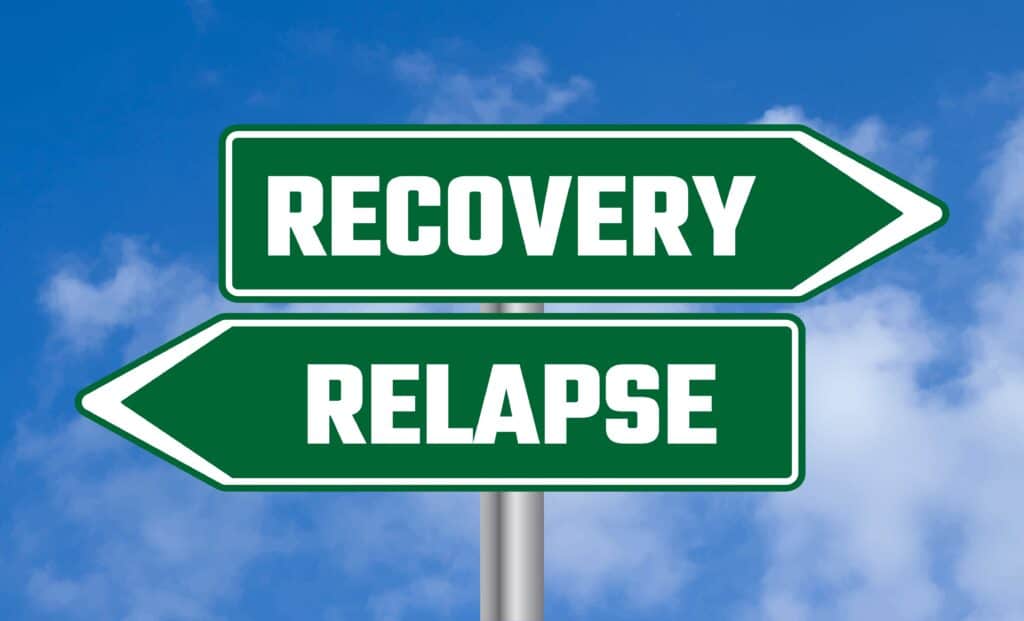10 Signs of Relapse You Must Know

Breaking free from drug addiction is no easy feat. Each year, thousands of people attempt to quit only to fail in their attempt, returning to active addiction. Within the medical community, this is known as relapse, and is unfortunately all too common. While relapse can occur even after an individual has received treatment for their substance use disorder, it is especially common among people who attempt to quit without the proper help in place. Addiction is an ongoing process. Nevertheless, many treat it as a short-term problem by only focusing on breaking the addict’s dependence, rather than addressing the underlying causes of the disorder and preparing the individual for a life without drugs and alcohol.
Relapse is nothing to be ashamed of, so long as the addict is open and honest about it happening. However, when they hide their relapse, it can quickly spiral out of control sending the individual back into a full-blown cycle of addiction. For this reason, it is valuable for family and friends to be familiar with the signs of relapse so they can step in to help their loved one. Fortunately, many of these are similar to the warning signs of addiction, so they may already be aware of what to look for.
Knowledge is key to providing help. Relapse begins as a mental setback before it becomes a physical one, meaning that there are a number of “tells” that an individual will display when they are falling back into old, unhealthy behaviors. Here are 10 common signs of relapse that you and your loved ones should be aware of.
1. Losing Faith in their Program
Relapse begins as a mental and behavioral setback before a return to drug and alcohol use occurs. A common reason for this is when the individual begins to lose faith in the path they are following toward a drug-free life. A key detail is that the addict begins to view their personal recovery program in a negative light. This could mean speaking poorly of its process and the support of rehab staff and fellowship members, expressing doubts about its chances of being helpful, or becoming hostile to the process as a whole. Which form this takes will depend on the person and their own tendencies for dealing with frustration, but what matters is that they are no longer fully committed to the treatment and recovery process.
2. Increased Stress
Many people remain addicted because their chosen substance becomes a coping mechanism for stress within their life. For this reason, one of the most important steps in the recovery process is for the individual to learn healthier coping mechanisms to serve as an alternative to using drugs. Without this, they would surely fall back on old behaviors once they felt stressed again, as they lack the means to cope.
If a patient’s rehab program has failed to provide them with effective and healthy coping mechanisms, they will eventually end up struggling with stress once again. This is a dangerous opportunity for relapse if they do not find help quickly. Additionally, a person who has already relapsed will inevitably experience increased stress, as they deal with the frustration of relapse. Left unchecked, this can easily cause the problem to spiral out of control and leave them caught in addiction once more.
3. Denial Returns
After an individual has relapsed on their drug of choice, they may find themselves back in a state of denial. At this point, the person may claim that they do not have a problem “this time” or may outright deny that they ever had a problem. Either scenario is a serious danger that can quickly leave them in the same position they were in before attempting to get sober. It is also likely that they will deny their relapse to further resist outside help and continue using.
4. Isolation
Regardless of whether they do it out of shame, fear of consequences, or a desire to continue using, an addict who relapses is likely to distance themselves socially from the people they were spending time with during recovery. Much like when their addiction began, they will avoid family members, friends, or other outside influences from recovery that try to reach out to them. The addict who relapses will likely seek to skip social events as well in favor of being alone.
5. Abandoning Structure
Recovering from addiction only works if the individual develops a concrete plan and makes a sincere commitment to follow it. Having structure is critical because it keeps the addict occupied with healthy activities, reducing the temptation to relapse by keeping their mind and body busy. When a recovering addict stops following their structure for no clear and appropriate reason, it is a serious tell that relapse is on its way.
6. Neglecting Responsibilities
Much like when a person first developed their addiction, a common sign of relapse is when they begin to neglect their responsibilities to work, family, and friends. Given that the individual will have spent time trying to repair these bonds and becoming responsible again during recovery, this change is frequently easier to spot than others. Of course, just like when a person is first addicted, they may also go to great lengths to hide their shortcomings by lying and covering up details.
7. Financial Problems Appear
When a person relapses and begins using their chosen substance again, they now have an additional financial cost to deal with. As the strength of their addiction returns, this can quickly drive them to financial ruin, as they will be unable to control their spending. Since an addict will likely attempt to cover up their relapse, on the outside it will seem as though their new financial struggles have no clear cause.
8. Ignoring Hygiene
One of the easiest ways to spot when a person has relapsed is when they begin neglecting their personal hygiene. This may happen because they are too distracted by their addiction to spare the time, or it may simply come from a lack of concern. While this warning sign does not appear in time to prevent relapse, it stands out among the rest. This is especially true as it is a direct contrast to how the individual would appear if they are practicing a program of recovery.
9. Growing Defensive when Questioned
Relapse is an embarrassing experience for a recovering addict, especially when they are not aware that it is a common part of the recovery process. For this reason, an addict who relapses and lacks a support system strong enough to hold them accountable, is likely to try and hide their setback. While this may be done by denying the relapse happened, it can also be handled by avoiding conversations about their recovery.
In these cases, the addict grows defensive when asked about their progress, getting aggressive (verbally or physically) when questioned, or simply trying to sidestep the conversation with a partial answer or by changing the subject. When this begins to happen, especially if the individual had previously been open about their progress, it is a sure sign of relapse.
10. Losing Control and Support
Once relapse occurs, it does not take long for the addict to spiral back into addiction if they do not quickly find outside support. However, since relapse can feel shameful and embarrassing, it may feel easier for them to hide the relapse. Doing this will only cause further problems though, and the individual may feel like they are losing control of their life again.
In many cases, the support networks that an addict had during recovery are lost because of choices they made, such as skipping support meetings or pushing away friends and family. This leaves them with a sense of loneliness, which is frequently accompanied by other feelings like depression and frustration. In reality though, these support networks are always available, but within their mind they fell that can no longer turn to these people due to their own insecurities.
Have You Relapsed? Get Help Today.
Unfortunately, addiction is a progressive disease with no cure. Once a person has crossed over the threshold into addiction, they will always be an addict, whether it be in recovery or active addiction. For this reason, relapse is always a possibility, thus the individual must commit themselves to a life of recovery every day. It is imperative to continue doing the things that were taught in the very beginning, such as going to meetings, talking with your sponsor, and having a strong support system. When temptation arises, the addict will have the means to address it with the help of others and their program.
When an individual faces relapse, Brookdale Premier Addiction Recovery is here to help. Our highly trained, expert care team recognize that relapse happens and utilize various clinical modalities to effectively address its symptoms, so patients may sustain lasting recovery.
.

